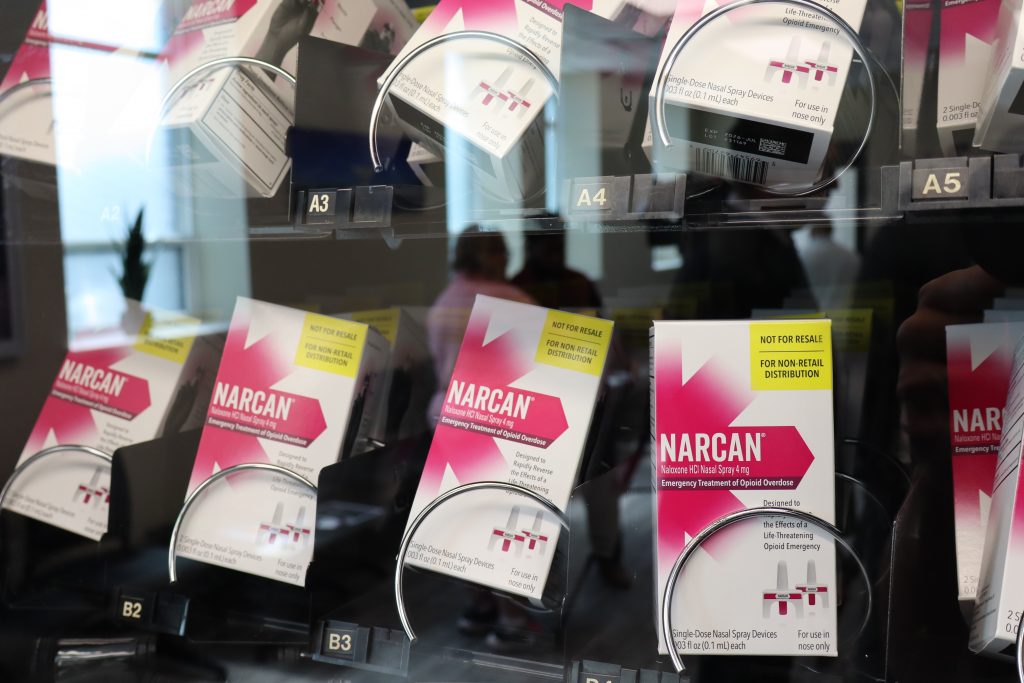Crowley Signs Opioid Program Funding
Legislation uses funding from legal settlement to take on opioid addiction epidemic.

Narcan nasal spray in a harm reduction vending machine. Photo taken Aug. 12, 2024 by Graham Kilmer
County Executive David Crowley signed a resolution Monday providing $8.5 million for programs addressing the opioid abuse epidemic in Milwaukee County.
The funding comes from some of the corporations that bear responsibility for the opioid epidemic in Milwaukee County and across the U.S. Crowley signed the resolution at Serenity Inns, an addiction treatment center in Milwaukee’s central city.
The county joined massive lawsuits against pharmaceutical companies, drug distributors and corporate pharmacies like CVS and Walgreens, eventually agreeing to $102 million in settlement payments from the firms. The funding is being paid out over 15 years. Five companies are making payments to the county totaling approximately $15.8 million in 2024.
In 2023, the county used the first payments it received to fund 15 projects, including medically assisted treatment and homeless outreach, using $11.8 million in settlement funds. This year, seven projects totaling $8.5 million were approved by the Milwaukee County Board. Crowley signed off on them Monday.
Some of the initiatives the funding supports include a new program partnering with EMS agencies to provide mobile access to medical opioid addiction treatments like suboxone; a new emergency housing facility for people experiencing homelessness and opioid addiction; and a new program that targets individuals with opioid addictions on their way in or out of incarceration, as Urban Milwaukee previously reported.
“We must address the addiction challenges that our residents are facing; we need to keep working to provide the access to substance abuse mitigation tools; we have to continue empowering our community on their healing journeys,” Crowley said before signing the legislation. “And at the end of the day, it is my strong hope that we will end the opioid crisis and continue to save lives in the future.”
Four projects managed by the county’s Department of Health and Human Services (DHHS) received funding. The funding will help the department bolster the capacity of the county’s substance abuse system, “which has not kept pace with the opioid epidemic,” said DHHS Director Shakita LaGrant-McClain.
In June, the county purchased the Hillview Building at 1615 S. 22nd St. DHHS built out new emergency housing space, including dedicated beds for persons experiencing opioid addiction. It will allow the department to provide substance abuse treatment to a range of people, from those on-site to people that have just come off of the street.
In Milwaukee County, someone dies from an opioid overdose every 16 hours, said Office of Emergency Management (OEM) Director Cassandra Libal.
“Our mission in the Office of Emergency Management is to help people in extraordinary times… and I don’t know about you, but that sounds pretty extraordinary to me,” Libal said.
OEM is receiving funding to use the county’s EMS system to deliver short-term and long-term opioid treatments directly to people suffering from addiction. The office is training first responders and EMS teams to supply county residents with naloxone, often referred to by the brand name Narcan, which can reverse the effects of an active opioid overdose, and buprenorphine, which is used to suppress the physical side effects of opioid addiction.
Dr. Ben Weston, chief health policy advisor for Milwaukee County, said the county is seeing a decline in overdose deaths for the first time since 2018.
This progress shows “why we must continue our efforts in providing both upstream as well as downstream support to members of our community who are struggling with substance use disorders,” Weston said.
Weston added that he is “particularly excited” about about the Post-Incarceration Access to Treatment and Healing program, which “targets and assists individuals at some of the highest risk times in their lives: immediately before and immediately after and following their release from incarceration.”
If you think stories like this are important, become a member of Urban Milwaukee and help support real, independent journalism. Plus you get some cool added benefits.
More about the Opioid Crisis
- Baldwin Demands Trump Admin Reverse Billions in Cuts From Opioid and Mental Health Programs - U.S. Sen. Tammy Baldwin - Jan 14th, 2026
- Fox Valley Nurse Practitioner Sentenced to Federal Prison for Unlawful Prescribing - U.S. Department of Justice - Dec 29th, 2025
- County Executive David Crowley Hosts Roundtable on Combating Opioid Crisis and Saving Lives in Wisconsin - David Crowley - Dec 16th, 2025
- Co-Chairs Criticize DHS For Lack of Plan, Transparency with Opioid Settlement Funds - Joint Committee on Finance - Oct 21st, 2025
- Opioid Treatment Program Opens First Clinic in Milwaukee - Isiah Holmes - Oct 20th, 2025
- County Executive Crowley, Chairwoman Nicholson Sign Legislation Approving $9 Million for Efforts to Compat the Opioid Crisis - David Crowley - Aug 15th, 2025
- How Are State’s Local Governments Spending Opioid Settlement Payouts? - Addie Costello - Aug 4th, 2025
- MKE County: How County Will Spend $9 Million in Drug Settlement Funds - Graham Kilmer - Jul 29th, 2025
- Milwaukee County Executive David Crowley Announces Over $9 Million for Initiatives to Combat Opioid Epidemic - David Crowley - Jul 17th, 2025
- AG Kaul, 45 Other Attorneys General Plan to Join $720 Million Settlement with Eight Opioid Drug Makers - Wisconsin Department of Justice - Jul 14th, 2025
Read more about Opioid Crisis here
Political Contributions Tracker
Displaying political contributions between people mentioned in this story. Learn more.
MKE County
-
Prosecution Rests Case in Dugan Trial
 Dec 17th, 2025 by Graham Kilmer
Dec 17th, 2025 by Graham Kilmer
-
Chief Judge Questioned About ICE Policy, Texts, Emails in Dugan Trial
 Dec 17th, 2025 by Graham Kilmer
Dec 17th, 2025 by Graham Kilmer
-
Fellow Judge Testifies in Dugan Case
 Dec 16th, 2025 by Graham Kilmer
Dec 16th, 2025 by Graham Kilmer


















